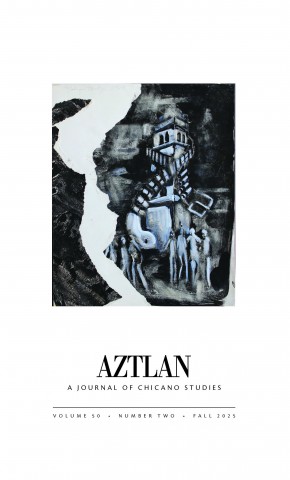Aztlán: A Journal of Chicano Studies
ABOUT
Aztlán presents original research that is relevant to or informed by the Chicano experience. An interdisciplinary, double-blind peer-reviewed journal, Aztlán focuses on scholarly essays in the humanities, social sciences, and arts, supplemented by thematic pieces in the dossier section, an artist's communiqué, a review section, and a commentary by the editor, Joshua Javier Guzmán. Aztlán seeks ways to bring Chicano studies into critical dialogue with Latino, ethnic, American, and global studies.
Aztlán has been the leading journal in the field of Chicanx studies since 1970. Aztlán is issued twice a year.
"Aztlán … signals the vibrancy of Chicano Studies."
— The Chronicle of Higher Education
"The preeminent scholarly journal in Chicano Studies."
— Magazines for Libraries
"This esteemed journal of record is essential for virtually all academic libraries."
— Library Journal
Aztlán is published by University of California Press (UC Press) in collaboration with CSRC Press. The journal is offered in print and digital formats.
For more information and to subscribe, visit online.ucpress.edu/aztlan.
Follow the journal's Facebook page.
LATEST ISSUE
Volume 50 Number 2
Fall 2025
Aztlán’s Fall 2025 issue opens with Charlene Villaseñor Black’s commentary on the art and activism of Malaquías Montoya, which focuses on the mixed-media collage (1969) featured on the issue's front cover.
Divana Olivas opens the Essay section with an exploration of Chicana/o food imaginaries in two politically oriented, Chicano movement–era publications, both issued in New Mexico: a newspaper, El Grito del Norte, and a book, 450 Years of Chicano History in Pictures. In the second of the two essays, Kristen Kolenz proposes "meso-mapping" as a way of representing how migrants live in and travel through the borderlands. The goal of meso-mapping is to re-envision the borderlands as a space of life rather than death.
The theme of the Dossier section, curated by Ella Maria Diaz, is the Department of Chicana and Chicano Studies at San José State University, which has the oldest Chicana/o studies graduate program in the United States. Along with Diaz, contributors Maria Elena Cruz, Juan Pablo Mercado, Rosanna Alvarez, Jonathan D. Gomez, Christine Vega, Kimberly I. Miranda, and Maria Luisa Alaniz offer their reflections on the historical importance of the program and its impact on education, activism, and student and professional life.
An interview with artist, activist, and UC professor emeritus Malaquías Montoya, conducted by Charlene Villaseñor Black and Ella Maria Diaz, is featured in the Artist's Communiqué.
Cover image: Malaquías Montoya, untitled mixed-media collage (San José State University), 1969. Charcoal, acrylic, and torn paper mounted on mat board, 23 x 19 inches. Based on a silkscreen created by Montoya in 1968 to promote the commencement walkout at San José State University. Photography by José Pérez.
To subscribe, click here.
To purchase and download digital issues, visit online.ucpress.edu/aztlan
EDITORIAL BOARD 2024–2026
Ella Maria Diaz, San José State University

